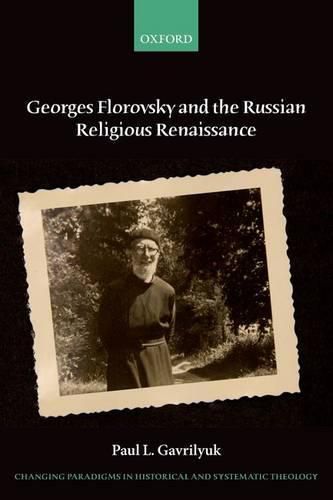Readings Newsletter
Become a Readings Member to make your shopping experience even easier.
Sign in or sign up for free!
You’re not far away from qualifying for FREE standard shipping within Australia
You’ve qualified for FREE standard shipping within Australia
The cart is loading…






Georges Florovsky is the mastermind of a ‘return to the Church Fathers’ in twentieth-century Orthodox theology. His theological vision-the neopatristic synthesis-became the main paradigm of Orthodox theology and the golden standard of Eastern Orthodox identity in the West. Focusing on Florovsky’s European period (1920-1948), this study analyses how Florovsky’s evolving interpretation of Russian religious thought, particularly Vladimir Solovyov and Sergius Bulgakov, informed his approach to patristic sources. Paul Gavrilyuk offers a new reading of Florovsky’s neopatristic theology, by closely considering its ontological, epistemological and ecclesiological foundations. It is common to contrast Florovsky’s neopatristic theology with the ‘modernist’ religious philosophies of Pavel Florensky, Sergius Bulgakov, and other representatives of the Russian Religious Renaissance. Gavrilyuk argues that the standard narrative of twentieth-century Orthodox theology, based on this polarization, must be reconsidered. The author demonstrates Florovsky’s critical appropriation of the main themes of the Russian Religious Renaissance, including theological antinomies, the meaning of history, and the nature of personhood. The distinctive features of Florovsky’s neopatristic theology Christological focus, ‘ecclesial experience’, personalism, and ‘Christian Hellenism’ are best understood against the background of the main problematic of the Renaissance. Specifically, it is shown that Bulgakov’s sophiology provided a polemical subtext for Florovsky’s theology of creation. It is argued that the use of the patristic norm in application to modern Russian theology represents Florovsky’s theological signature.Drawing on unpublished archival material and correspondence, this study sheds new light on such aspects of Florovsky’s career as his family background, his participation in the Eurasian movement, his dissertation on Alexander Herzen, his lectures on Vladimir Solovyov, and his involvement in Bulgakov’s Brotherhood of St Sophia.
$9.00 standard shipping within Australia
FREE standard shipping within Australia for orders over $100.00
Express & International shipping calculated at checkout
Georges Florovsky is the mastermind of a ‘return to the Church Fathers’ in twentieth-century Orthodox theology. His theological vision-the neopatristic synthesis-became the main paradigm of Orthodox theology and the golden standard of Eastern Orthodox identity in the West. Focusing on Florovsky’s European period (1920-1948), this study analyses how Florovsky’s evolving interpretation of Russian religious thought, particularly Vladimir Solovyov and Sergius Bulgakov, informed his approach to patristic sources. Paul Gavrilyuk offers a new reading of Florovsky’s neopatristic theology, by closely considering its ontological, epistemological and ecclesiological foundations. It is common to contrast Florovsky’s neopatristic theology with the ‘modernist’ religious philosophies of Pavel Florensky, Sergius Bulgakov, and other representatives of the Russian Religious Renaissance. Gavrilyuk argues that the standard narrative of twentieth-century Orthodox theology, based on this polarization, must be reconsidered. The author demonstrates Florovsky’s critical appropriation of the main themes of the Russian Religious Renaissance, including theological antinomies, the meaning of history, and the nature of personhood. The distinctive features of Florovsky’s neopatristic theology Christological focus, ‘ecclesial experience’, personalism, and ‘Christian Hellenism’ are best understood against the background of the main problematic of the Renaissance. Specifically, it is shown that Bulgakov’s sophiology provided a polemical subtext for Florovsky’s theology of creation. It is argued that the use of the patristic norm in application to modern Russian theology represents Florovsky’s theological signature.Drawing on unpublished archival material and correspondence, this study sheds new light on such aspects of Florovsky’s career as his family background, his participation in the Eurasian movement, his dissertation on Alexander Herzen, his lectures on Vladimir Solovyov, and his involvement in Bulgakov’s Brotherhood of St Sophia.